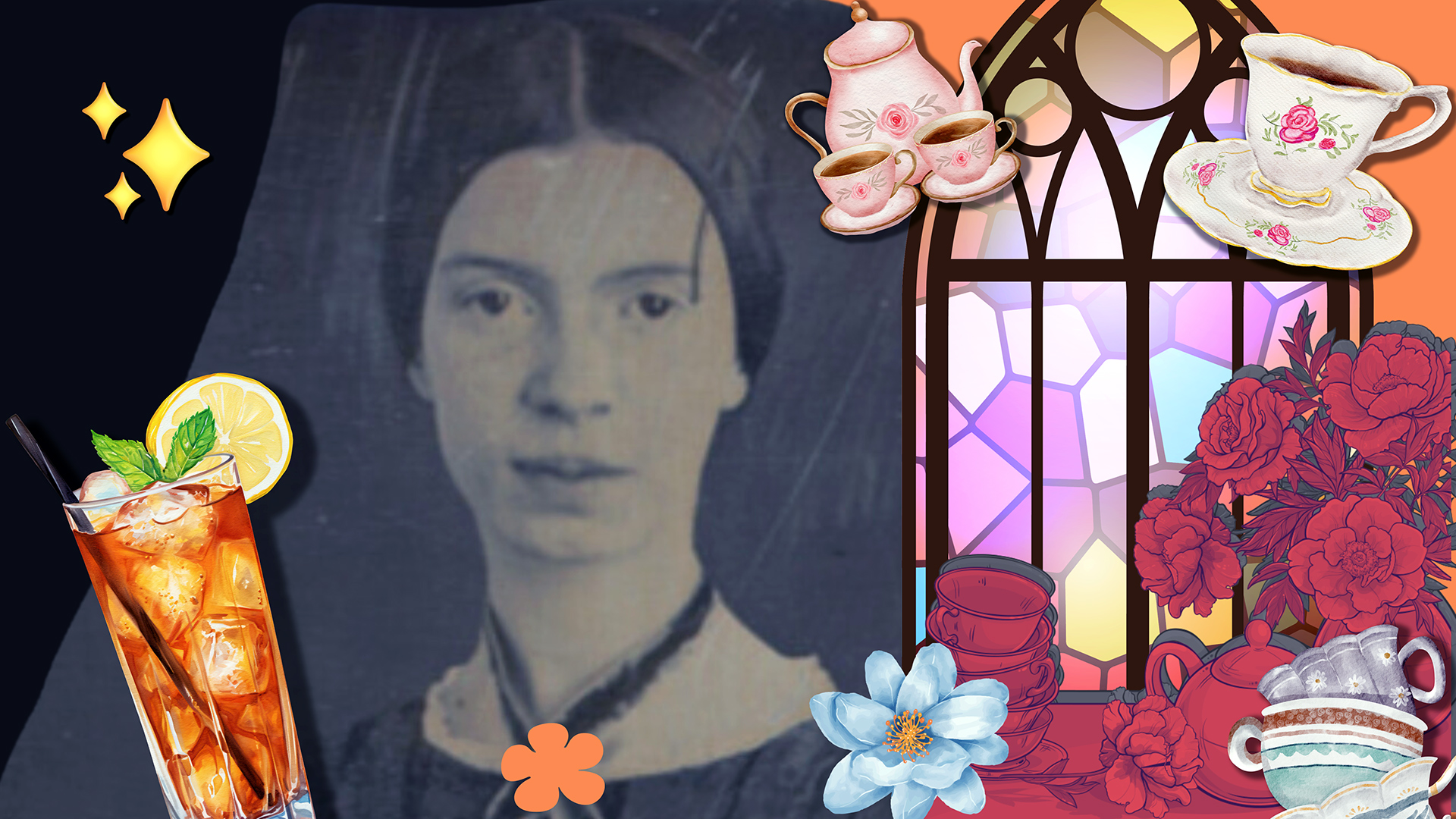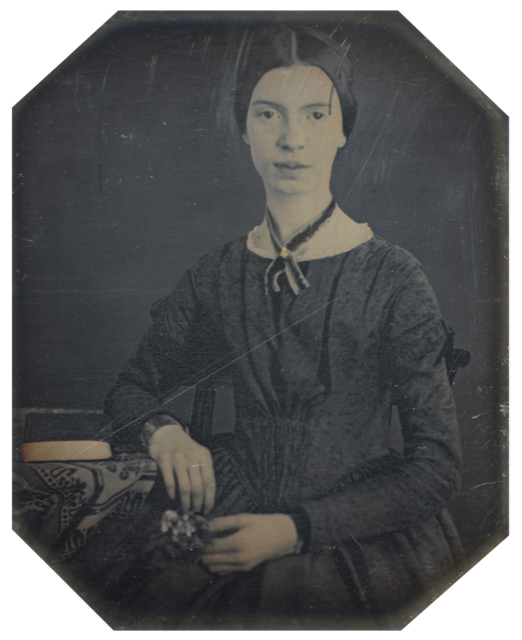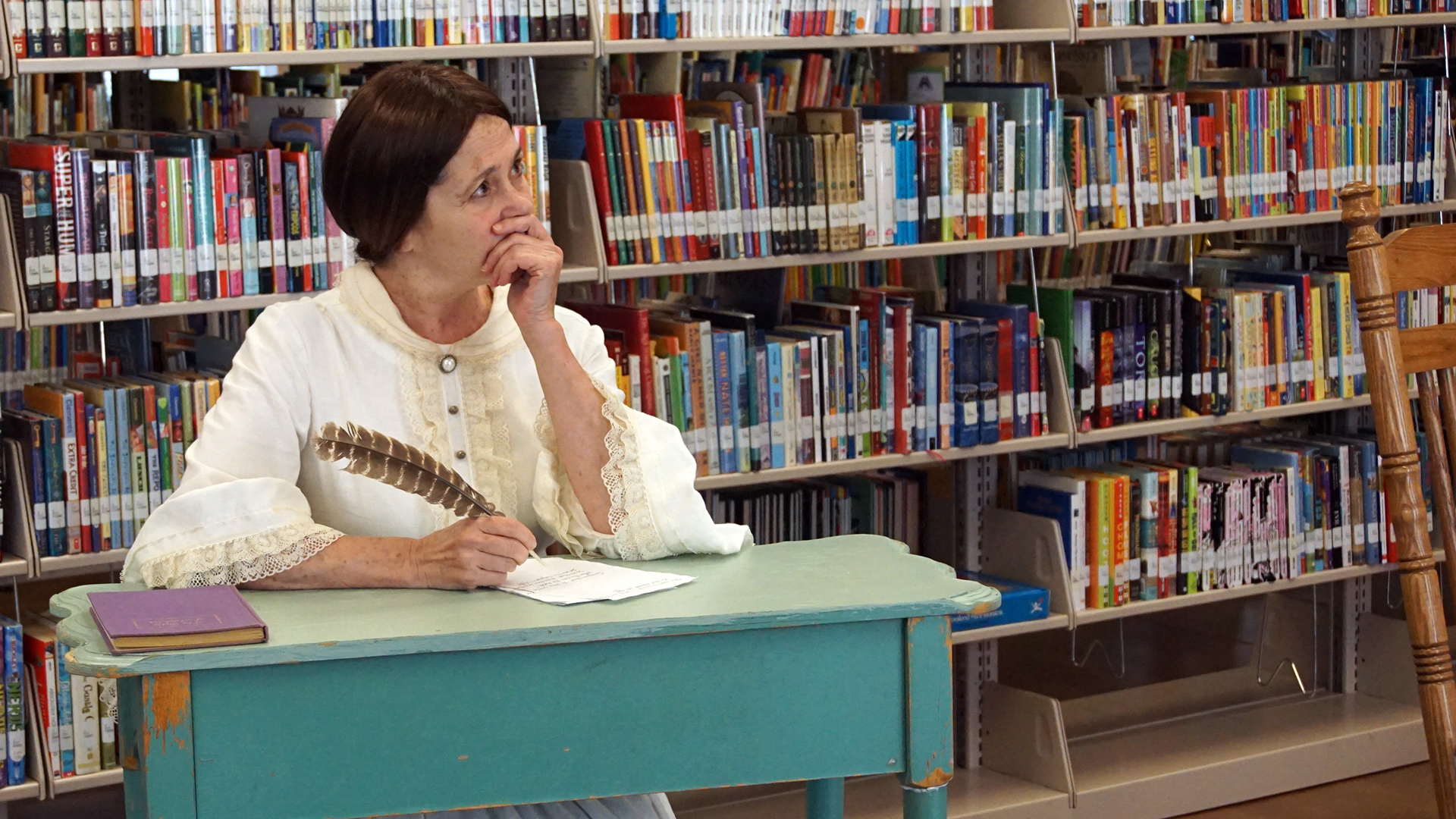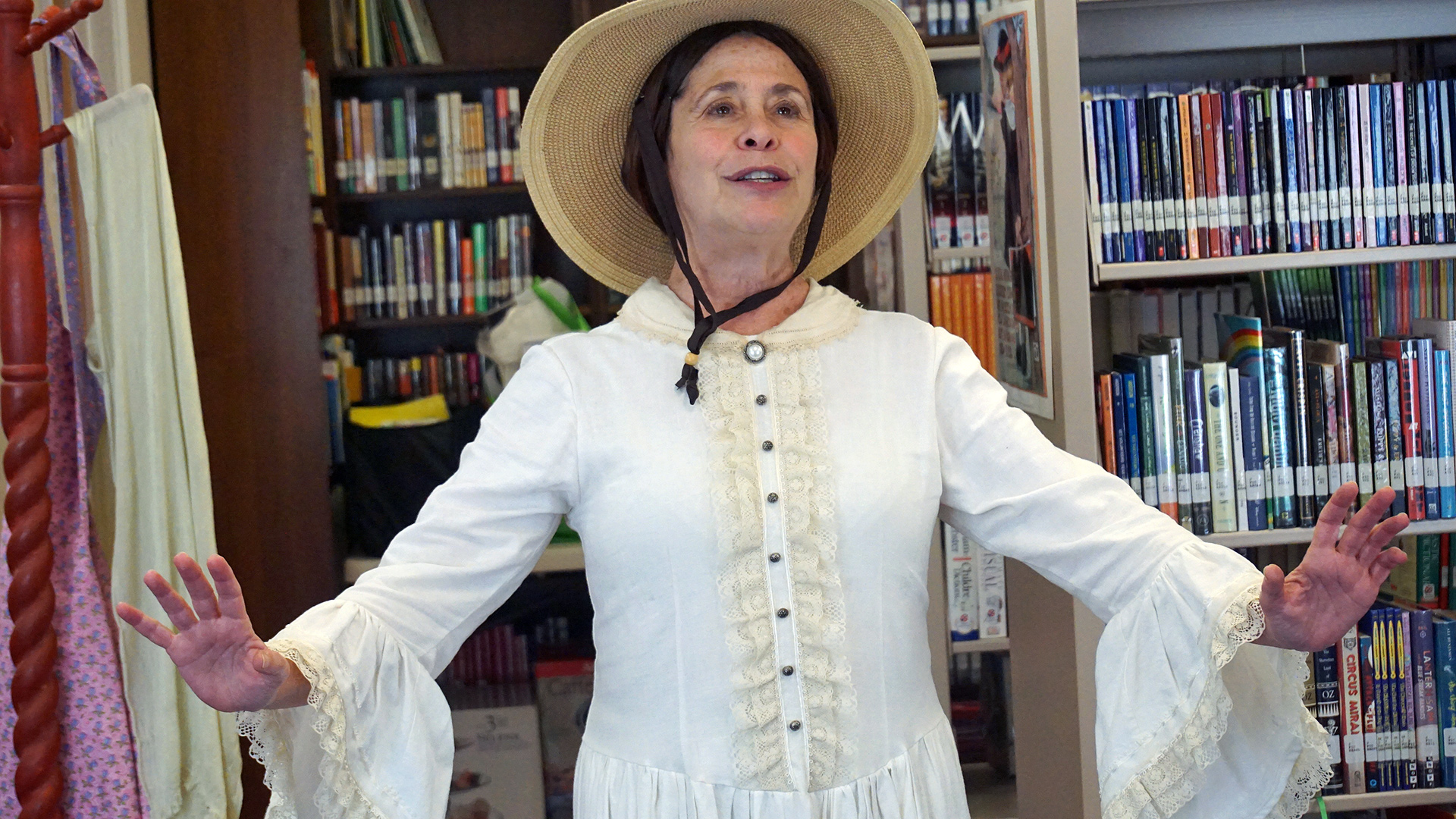
Sweet Tea With Emily Dickinson
How a small crew in tiny Whitesburg, Georgia, turned the work of a 19th century New England poet into a touring fundraiser for small-town public libraries in the South.
Tell all the Truth but tell it slant—
Success in Circuit lies
Too bright for our infirm Delight
The Truth’s superb surprise
—“Tell All the Truth but Tell It Slant”
Emily Dickinson, circa 1858-1865
Emily Dickinson probably never heard of Whitesburg, Georgia. Few people have. Perched along the red-clay Chattahoochee River, Whitesburg is a fairly forlorn crossroads in the lushly forested countryside forty miles southwest of Atlanta—a town not so much time-forgotten as time-ignored.
A single train track still runs beside Main Street, a lone reminder that the railroad is the reason this place exists. In 1854—the year Emily Dickinson turned twenty-four in Massachusetts—construction commenced on a rail line between the cities of Griffin and Carrollton, only to be stalled by the Civil War. Where the track stopped, just over the river, a small enclave sprang up spontaneously, the momentum of laying track expressing itself vertically as lodgings and saloons, a pop-up frontier town in Wild West Georgia. And since a Mr. A. J. White was then president of that railway, the impromptu village became known as White’s Burg.
Today, there are at least as many meth labs in Whitesburg as there are evangelical churches. The train doesn’t stop at all anymore. Galloping through town with a shriek Dickinson the poet described as “Complaining all the while/In horrid—hooting stanza—”the locomotive alone laments the fact that people no longer come here for a good time. Container cars rattle past tarp-roofed trailers and ramshackle bungalows on one side of the track, an abandoned cinder-block warehouse, empty crumbling red-brick stores, and a smokin’ Senior Citizens Center on the other.
Of the 600 citizens who live within the city limits, most subsist below the poverty line. Whitesburgers pride themselves on their independence and their opinions, which given together presents as ornery, a gruffness tempered by a genuine impulse to take care of one another. The town boasts a Primary Health Care Clinic; a Christian Ministries Food Bank; 3 churches; an elementary school; a recreation center with a water park and sports field; a post office; a used bookstore; a Dollar General Market—oh yes, and a library.
Under the guiding hand of the Rural Library Project in Yatesville, Georgia, Whitesburg’s modest passive-green library building came into being when local citizens united in the belief that Whitesburg could not survive into the future without one. Arguably the town’s crown jewel (arguably, sadly, is the operative word), the library has grown organically, exponentially, into a community center, offering books and computers to households lacking both; also GED and literacy classes, science and arts workshops, story times, exercise classes, tax-filing help, movies, gardening, crochet—I could go on. Teenage boys still slouch down Main Street, but now their arms are full of books.
Many, though not all, are elderly, retired, divorced, or widowed women—the 21st century version of Little Old Ladies in Sneakers Changing the World. Only these gals are pickleball slim and decked out in Mary Janes with cleats. I know because I’m one of them.
Yet our little rural library has met with resistance and been threatened with closure due to lack of funding several times in its fourteen-year lifespan. It’s an old story I suppose: city vs. country; status quo vs. change; fear vs. possibility.
The library might not exist at all save for a dogged volunteerism that’s determined to keep it alive. Harvey’s House of Books, a shop selling used books, was created by the Friends of the Whitesburg Public Library to raise money for new library books, and is run entirely by volunteers. Many, though not all, are elderly, retired, divorced, or widowed women—the 21st century version of Little Old Ladies in Sneakers Changing the World. Only these gals are pickleball slim and decked out in Mary Janes with cleats. I know because I’m one of them.
The last time we thought the library might close, I asked myself, what can I do? What can I offer besides whatever skills I have as a writer and actor? That’s when Emily Dickinson tapped me on the shoulder.
I’m Nobody? Who are you?
Are you—Nobody—too?
Then there’s a pair of us? Don’t tell!
They’ll banish us—you know!
I wasn’t always in love with her poetry. Feels like heresy to say so now. First encountering the work of “America’s best-loved, least-known poet” in high school, my reception lacked luster, to say the least. There was no teacher to inspire me or push me to explore the deceptive simplicity of rhymes like the verse above.
It wasn’t till I read William Luce’s one-woman show, The Belle of Amherst, that the poet and her poetry pierced me. Written for Julie Harris in 1976, the three-hour production ran on Broadway for years. Delving into minor details, Luce brought Dickinson alive through the enigmatic voice extracted from her journals, letters, and poems. Instead of the wan reclusive wraith of legend—the madwoman who refused to leave her house for thirty years—I found a person who was funny, animated, loving, and relatable.
A notion of performing the play to raise money for the library sprouted. But first I’d have to cobble the script down to an hour, mainly because there was no way in hell I could memorize three hours of monologue. At sixty-eight, I could barely remember my ZIP code. Figuring I’d perform the play for the six county libraries, what qualities would I select to make this well-to-do, 19th century Yankee identifiable to Southern countryfolk of little means trying to survive in a jumbled modern world?
Amherst, Massachusetts is a grander place than Whitesburg ever aspired to be, but in Emily’s time, it was still considered provincial. Which meant it was a petri dish for local characters, Emily being the most notorious. Now that was something to which Whitesburgers could relate! Surely eccentricity transcends time, state lines, and regional prejudices. We’re chock full of oddballs here. I know because I’m one of them.
I wanted to investigate the vitality of her writing life, the conscious choices she made to protect it. A Puritan female, and frail besides, she was constrained by societal and familial demands, yet she found joy—ecstasy even—in nature, in her work, in the people she loved. I wanted the audience to feel the rhythm of her narrow days and nights: sewing, baking, picking apples, penning profound rhymes. If her outer life was small and confined, her inner life was sensitive, vivid, limitless; nothing human escaped her. She knew illness, heartbreak, loss—tragedies no one must leave home for because they come right up to your door. Most people, no matter their circumstances, could relate to Emily’s suffering. And she was a gardener. Rural folks know about growing things.

I looked for passages I could memorize, that felt actable. What of her life was true for mine? A solitary bent. A congenital passion for words and beauty. I chose sentences for the sheer pleasure of saying them aloud: Mines in the same ground meet by tunneling. Slipping into Emily’s formidable shoes, metaphorically speaking, meant that for an hour I got to be a genius.
Bobbe Toub agreed to be my prompter; to hold the script at each performance and cue me in case I forgot a line. In that way, I gave myself a safety net to mitigate against the mortifying possibility of a senior moment onstage. A professional cellist, Bobbe also became music director, finding piano pieces from Emily’s lifetime to begin and end each act: Schumann, Robert McDowell. Actor/director Marnie Andrews showed me the constancy in the flow of words, the totality of being present as Emily. Costumer Lee Kyle created a lace-trimmed gown of white muslin, the poet’s monochromatic emblem. And with the help of storyteller Jill Olesker, I found a long auburn wig severely parted down the middle in the fashion of Emily’s time, when drab was the new chic.
One by one, the pieces fell into place. Suddenly it was opening night at the Whitesburg Public Library in October 2018.
A word is dead
When it is said,
Some say.
I say it just
Begins to live
That day.
The library was packed with friends, volunteers, curious neighbors, and a handful of closeted Emily Dickinson fans. The stage area, already small, was encroached by the audience. To get to Emily’s rocker downstage, I had to lift my skirts and sidestep over feet. Sitting down, my knees were inches from knees in the front row.
The premise of Luce’s play is that the audience has come for tea with the reclusive poet. At first she stammers and is shy but once she gets going, like most people who spend a lot of time alone, she can’t stop. In particular, she speaks of poetry, at one point rhapsodizing about true poets by saying, They make my whole body so cold no fire can ever warm me, I know that is poetry.
Then she asks a visitor/audience member: Have you ever felt that way?
I directed the query to Jean Hudson, a librarian who loves stories as much as anyone I know. The question went through her with a shiver and a nod. Turning, I met the gaze of Edy Maxwell, a devout Christian volunteer, her eyes full of tears. My mind went completely blank, and I had to ask Bobbe for the next line. I was ecstatic: Emily was making an impact.
We made $600 in donations that night. What’s more, there was unexpected momentum. All at once we were playing in living rooms, a yoga studio, a recital hall—even a well-funded library in a neighboring county offering the novelty of an elevated stage. It seemed we were actually doing this.

In May 2019, Bobbe and I packed her Prius with the set, props, and costume, and drove down to New Orleans. We’d been invited by resident Joe Bucher to perform in his swank retirement home near the French Quarter. With valanced curtains and a grand piano, the designated room was ballroom-sized, named, appropriately, The 1857 Room. At least forty people were expected to attend. I’d have to fill the cavernous space with my voice.
“This will be my Ethel Merman performance,” I commented to Bobbe.
At the top of the play, Emily briskly brings on an (imagined) tea set on a tray (the audience is here for tea, after all). At first she’s unaware of her guests, but when she realizes they’re there, the first words out of her mouth are: Forgive me if I’m frightened.
Before I could take the next breath, an old lady waved an arm and called raucously from the first row, “Oh, don’t worry about it, darlin’!” She was quickly shushed.
I guess I ought to be pleased I was that convincing. Her shout was a harbinger of the chaos to come. Pill alarms went off every few seconds. Someone had a coughing fit, which, as we all know, is contagious. Others (I confess) were snoring. Still others in wheelchairs had to be rolled abruptly from the room for reasons one hesitates to guess.
Someone had a coughing fit, which, as we all know, is contagious. Others (I confess) were snoring. Still others in wheelchairs had to be rolled abruptly from the room for reasons one hesitates to guess.
Those who remained were a terrific audience. Laughing at Emily’s wit, rapt at the proper moments, afterwards asking questions that spoke of a lifelong love of the arts. A beshawled woman stood up on a walker and wanted to know if I was channeling Emily Dickinson.
“No,” I replied, not adding that I wouldn’t presume. “What I think happens is that my instrument—body, voice, emotions, history—collides with Emily’s words and a third thing arises. That’s the performance.”
“How do you prepare?” she persisted in a soft-spoken drawl.
I peered at her. “That’s an actor question. Are you an actor?”
Her head dipped. “A lifetime ago,” she whispered.
I smiled. “I put on the dress and that unflattering wig and try to get very quiet inside. When I come out, I ride the words. I let the words carry me.”
She nodded, eyes glittering. “You can trust that.”
In sixteen months, we raised almost $10,000 to the library. Then COVID struck.
When it comes, the Landscape listens—
Shadows—hold their breath—
When it goes, t’is like the Distance
On the look of Death—
April 2023. Emily and I are on our way to Southwestern Virginia Community College’s Festival of the Arts in Tazewell County. Coal country Virginia. The recommendation has come through Roanoke high school pal Barbara Wise, and as the theme of the Festival is Visionaries, Emily has long been considered a shoo-in.
The original appearance was scheduled for Spring 2020. It was postponed to the following year. That year and the next were also postponed. Finally, three years later, we are driving from Georgia to Tazewell in filmmaker Kevin Triplett’s truck. Kevin is taking Bobbe’s place as prompter, stage manager, and general actor-whisperer.
I’m nervous. I haven’t done the play for two-and-a-half years. I feel rusty, to say the least—Oz’s Tin Woodsman kind of rusty. Plus, I’m older now, seventy-two. In a fit of ego and artistic greed, I committed to doing four shows in five days, which promises to be creatively rewarding but is physically guaranteed to kick my butt.
Mary Lawson, the mastermind of the Festival of the Arts, framed the productions as “Tea With Emily Dickinson,” in the likely event that nobody knew who this Belle of Amherst was. I was prepared for “Sweet Tea With Emily Dickinson,” as the beverage is so beloved in the South the Georgia State Legislature once considered amending the state constitution to ensure that every Georgia restaurant offered sweetened tea. Mercifully, the amendment did not pass, as everyone knows sweet tea is a responsibility, not a right.
The four festival performances are to take place in three libraries and one arts center. Local Friends of the Various Libraries each sponsor a show, taking up the tea theme with enthusiasm. I’d get my first sip of their devotion at the premiere performance at the Tazewell County Public Library in Bluefield.
The Bluefield library is at least three times the size of Whitesburg’s. A stand-up exhibit featuring the Suffragette Movement of Southwest Virginia greets us as we come in the door. Their Friends group has made a lavish tea for after the performance, an effort spearheaded by Amity Layne whose zeal for libraries is unsurpassed by any Whitesburger and whose demeanor befits her name.
Sweet tea is so beloved in the South the Georgia State Legislature once considered amending the state constitution to ensure that every Georgia restaurant offered it. Mercifully, the amendment did not pass, as everyone knows sweet tea is a responsibility, not a right.
A handsome, ample woman of indeterminate age with a latticed scar disappearing into her cleavage, Amity displays her passion in an introductory speech to the audience before the show. And in the plea for donations she makes at intermission. And in the one after the show. In fact, when I go out for the curtain call, I find Amity already on stage.
She looks as surprised to see me as I am to see her.
“Oh,” she says, momentarily speechless. Then she gives an airy wave. “Well—take your little bow.”
Which I proceed to do, before a very confused audience. College students, Dickinson fans, local farmers, and women of a certain age swirling Lord-knows-what in the plastic cups they’d brought from home—embellished Sweet Tea? As an audience, they’ve been responsive and attentive. Now a few struggle to their feet for what is either going to be a standing ovation or a rush for the exit, and Amity finishes her speech.
A few minutes later, the rest file up to the fiction stacks, where tables of teapots, fruit, finger sandwiches, and homemade cookies beckon. Still in costume (though not in character), I mingle, regaled by tales of transformative encounters with Emily’s poetry. Some guests are shyly moved to take selfies with the poet, or at least a reputable likeness. At times it seems these gentle countryfolk are of the 19th century, and Emily is the modernist, the catalyst, the radical.
The next night’s performance is at the Appalachian Arts Center on the Clinch River in Cedar Bluff. The renovated 18th century watermill has a long bank of windows opening out onto the water. A two story, white frame house looking very New England-ish stands on the other side. This show is also sponsored by Amity’s Friends group.
After the performance, as I come around the corner to take my little bow, here comes a smiling Amity barreling toward the stage from the opposite wing. She’d have beat me to the spotlight if Kevin hadn’t tackled her and suggested she give me a moment. Which she does.
Rumor has it Amity raised over $15,000 in those two nights. I can’t help but love her tenacity; she reminds me of my library friends at home.
A Bird came down the Walk—
He did not know I saw—
He bit an angleworm in halves
And ate the fellow, raw
A wiry white-haired woman jumps into my path quoting this stanza as I enter the Buchanan County Public Library. After my delighted applause, Marie reveals that she is a retired high school English teacher with a passion for the poet which she passed on to her students, one of whom now works in this library and will be here today.
“You’re the teacher I wish I’d had,” I tell her.
The library is far west, almost to West Virginia, and deep in coal country. The winding river road that brought us to Grundy is lined with sooty coal-loading tipples that could be out of the 19th century: early Industrial Revolution clunky. Funded by these same coal companies, as restitution no doubt, the library is literally built into the side of a mountain. Inside it’s spacious and brimming with friendliness.
Sherry Bright, the head librarian, has a motherly manner that makes you want to be read to immediately. She ushers us into the performance space. Sherry and her staff have removed the rows of chairs, replacing them with long tables, white tablecloths, real flowers, candles, hot tea in pots, crustless sandwiches, and scones they made in the adjacent kitchen just that day. They’ve taken the Sweet Tea With Emily ethos to a hospitable elegance.
Sherry knows her audience. They do not disappoint. Mostly older rural women, the ladies arrive dressed for tea and that means tea bonnets. Wide-brimmed, colorful, bedecked with silk flowers, tulle and taffeta, these hats are like a garden unto themselves as I look out over them as Emily. Marie’s jaunty hat is made of straw, and I could swear a price tag dangles from it. I feel an enormous tenderness for them all.
Each audience has its collective presence. Some are quiet, some boisterous; they’re all different. These women in their bonnets have given me a gift of play and innocence, as well as a sincere willingness to engage the afternoon (besides, who can say no to warm scones?) As far as I can tell, there are two men present, and a table of three children in the back. It’s hard to see the kids but I feel their attention. Another gift.
Afterward, I visit every table. The first is filled with ladies in grand hats. The only hatless woman—her thick moonlit hair ornament enough—says right off, “I spend a lot of time alone myself.”
I’d considered that Emily’s isolation might ring differently after the COVID shutdowns. The women nod, the silk blooms on their hats bobbing. Is it COVID—or the loneliness of old age? Or are some telling me they—like Emily and myself—have learned to keep company with beauty and the solace of the soul? There is no time to find out, yet to this day I wonder.
Nearly 200 years after her birth, Emily Dickinson’s mystique still mystifies. Her poems are a paper trail of almost 2,000 paradoxes, stepping in and out of each other like an elegant line of fox prints in the snow.
At a table in the back, another hatless woman sits with her son, a small grim man with biceps like tennis balls and thinning blond hair. Says the mother, “I’m explaining to him how rough women have had it. He didn’t know about that.”
The son nods. He looks chagrined. I try to estimate his age: How could he not know? And then I think, why would he? We talk about Emily’s father, how she adored him even though he wouldn’t let his daughters marry. How he disdained the idea of a woman in a public profession, like being a published writer.
“She figured out how to have a rich life anyway,” I say, as the son sinks lower in his seat, looking younger by the minute.
His mother beams at him. “He’s a sweet boy,” she croons, patting his knee.
At the kids’ table, the tallest girl turns to me and declares, “I liked it when you screamed.” She’s referring to the moment when Emily’s (imaginary) father discovers her awake and secretly writing in the middle of the night. His sudden appearance at her door literally makes her shriek with fright.
The girl and her two younger sisters are being homeschooled. I praise their ability to stay with the play. Their mother shrugs. “I didn’t know if they’d make it. They’ve never seen anything like this. You can bet we’ll be reading her. They’re intrigued now.”
Nearly 200 years after her birth, Emily Dickinson’s mystique still mystifies. Her poems are a paper trail of almost 2,000 paradoxes, stepping in and out of each other like an elegant line of fox prints in the snow. To find that phospherescence, that light within, that is the genius behind poetry, she wrote, all the while claiming not to know what genius means.
Similarly, she said about war: War is so oblique, I can’t grasp it. My wars are laid away in books. Yet she was able to pen these lines:
Not one of all the purple Host
Who took the Flag today
Can tell the definition
So clear of Victory
As he defeated—dying—
On whose forbidden ear
The distant strains of triumph
Burst agonized and clear!
The hillsides around the town of Lebanon, Virginia, are clad in cedar, like the biblical Cedars of Lebanon. Our last performance at the Russell County Public Library poses a curious challenge. The back wall of the stage is a War Memorial. Deep brown glass consecrates the county’s fallen soldiers from World War II, Korea, Vietnam, and the Gulf and Iraq wars, the names of the dead in raised brass letters. This will be the immediate backdrop of the play; I’ll be acting in its shadow, literally.
We’ve performed in front of fireplaces, flags, a grand piano, even a Jackson Pollackesque painter’s drop cloth. This isn’t that. Not one to glorify war, I nevertheless understand that the sacrifices of our soldiers deserve recognition. Clearly, this War Memorial has meaning for the Lebanon community. They’ve chosen to put it in their library, a building belonging to everyone, out of the way of weather and vandals. Emily herself lived through the Civil War; far from battle, she grieved for the young men in Amherst who went to fight and did not return. I cannot ignore the War Memorial.
Fortunately, Emily—and playwright Luce—have written a solution into the play. In act 2, Emily—shattered when prestigious editor Thomas Wentworth Higginson misunderstands her work—is moved to express her feelings through a poem that begins, Success is counted sweetest/By those who ne’er succeed/To comprehend a nectar/Requires sorest need.
The moment comes for me to recite the second verse. Turning upstage, I speak the lines in Emily’s voice directly to the names on the wall: Not one of all the purple Host...To those soldiers whose tragic fates the poet had foreseen 100 years before they died—for their families, for Lebanon, for the country they loved.
Time upends. The library goes quiet. The walls have contracted, as if the room itself is holding its breath. At that moment, three currents converge: libraries, poetry, and all of us gathered here, living and dead.
In the shared stillness, people cry. I know because I am one of them.

About the author
Sybil Rosen is an award-winning young-adult novelist, playwright, and short-story writer. Her 2021 picture book, Carpenter's Helper, was recently selected for Dolly Parton’s Imagination Library. In 2008, she published a memoir of her life with Texas music legend Blaze Foley called Living in the Woods in a Tree: Remembering Blaze Foley. That book became the basis of director Ethan Hawke's 2018 biopic, Blaze, which Rosen co-wrote with Hawke. She lives along the Chattahoochee River with her dog, Shine.



Great story! I love the country in Heard Co. Beautiful creeks, fascinating tales, interesting characters, delicious BBQ at roadside eatery with the Chattahoochee River as the backdrop.
Sybil Rosen, you are quite the consummate bard: raconteur, interpreter, author and theatrical genius.
Thank you, Salvation South, for bringing her work into your spotlight(s).